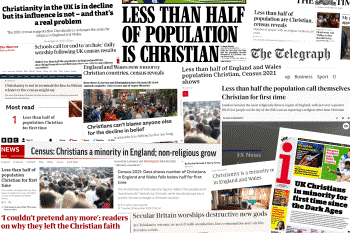Today’s 2021 Census results reveal one of the biggest demographic changes of the last decade: England and Wales are now officially among the least religious countries of the world. The population identifying as non-religious has jumped by over eight million from 25% to 37% since 2011. In Wales, it’s even higher, at 47%, up from 32%. For the first time in Census history (and perhaps in modern history full stop) Christians are a minority in the UK. It’s a hugely significant moment for the UK, and one that calls for government and lawmakers to rethink the overblown role of religion in society.
In practice, because the question is leading in how it is phrased, the real figure of people who are actually religious in any meaningful sense that a person on the street would use the word is even lower. Many people who tick a religious box do so despite not believing in or practising a religion. Research last time round found only 48% of ‘census Christians’ believed Jesus was a real person who was the son of god. Less than 5% of the English population regularly attends church. The British Social Attitudes Survey, which asks a far less presumptuous question, reveals that 53% of the population is non-religious. What’s striking then – even by Census terms – is just how at odds the population has become from the state itself.
No state in Europe has such a religious set-up as we do in terms of law and public policy, while at the same time having such a non-religious population . The UK and Iran are the only two sovereign states in the world to award unelected clerics of the established state religion votes in their legislature. No other country in the world requires compulsory Christian worship in schools as standard. The non-Christian majority in England and Wales face everyday discrimination – in everything from receiving appropriate emotional support in hospitals to education. A third of state schools in England are Christian, and 16% of places across state schools have religiously selective admissions policies. The discrimination extends to major life events too. Unlike in Scotland and Northern Ireland, where humanist marriages are legally recognised – and popular, the UK Government refuses to enact recognition in England and Wales. It’s had the legislative power to bring about change almost overnight since 2013.
These figures should be a spur to create a more inclusive approach to people of different religions and non-religious ways of life across our law, policy, and public life. The pace of change is astounding – both the growth of the non-religious and the decline in the religious has occurred at a faster rate than between 2001 and 2011. The non-religious population has grown by almost 60% in this decade.
The Census results mark a watershed moment in our history. No longer can anyone plausibly claim that the UK is a Christian country, and no longer can decision makers and religious lobbyists justify the policies that have entrenched discrimination against the non-religious for decades. In any case, even if today’s results had shown the UK to be 99% Christian, 99% non-religious, or 99% Muslim, the argument for secularism remains. Everyone must have the right to live in a country that respects their universal right to freedom of religion or belief.
